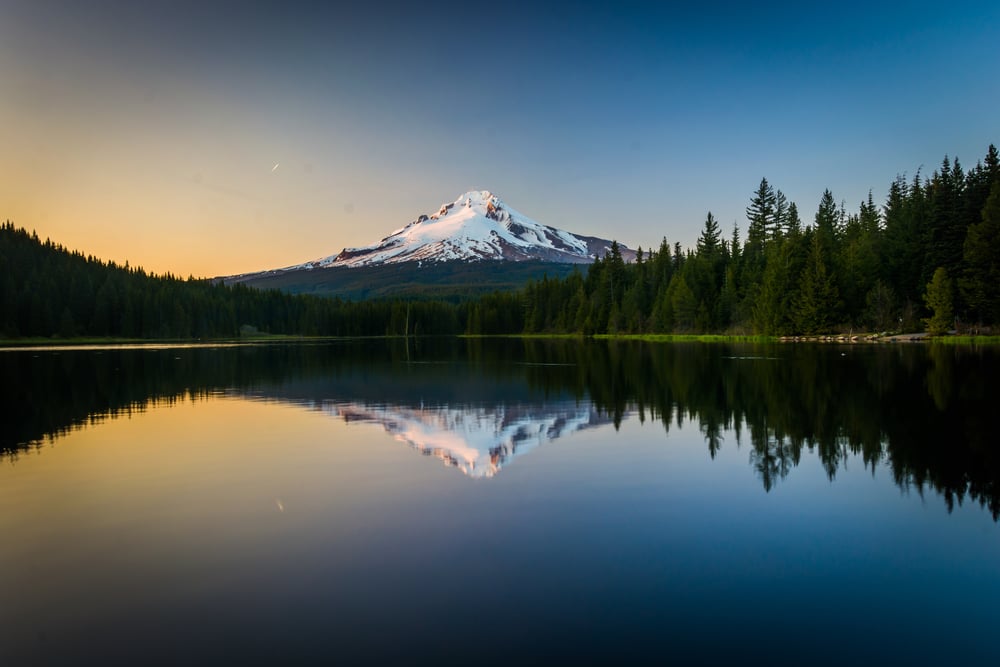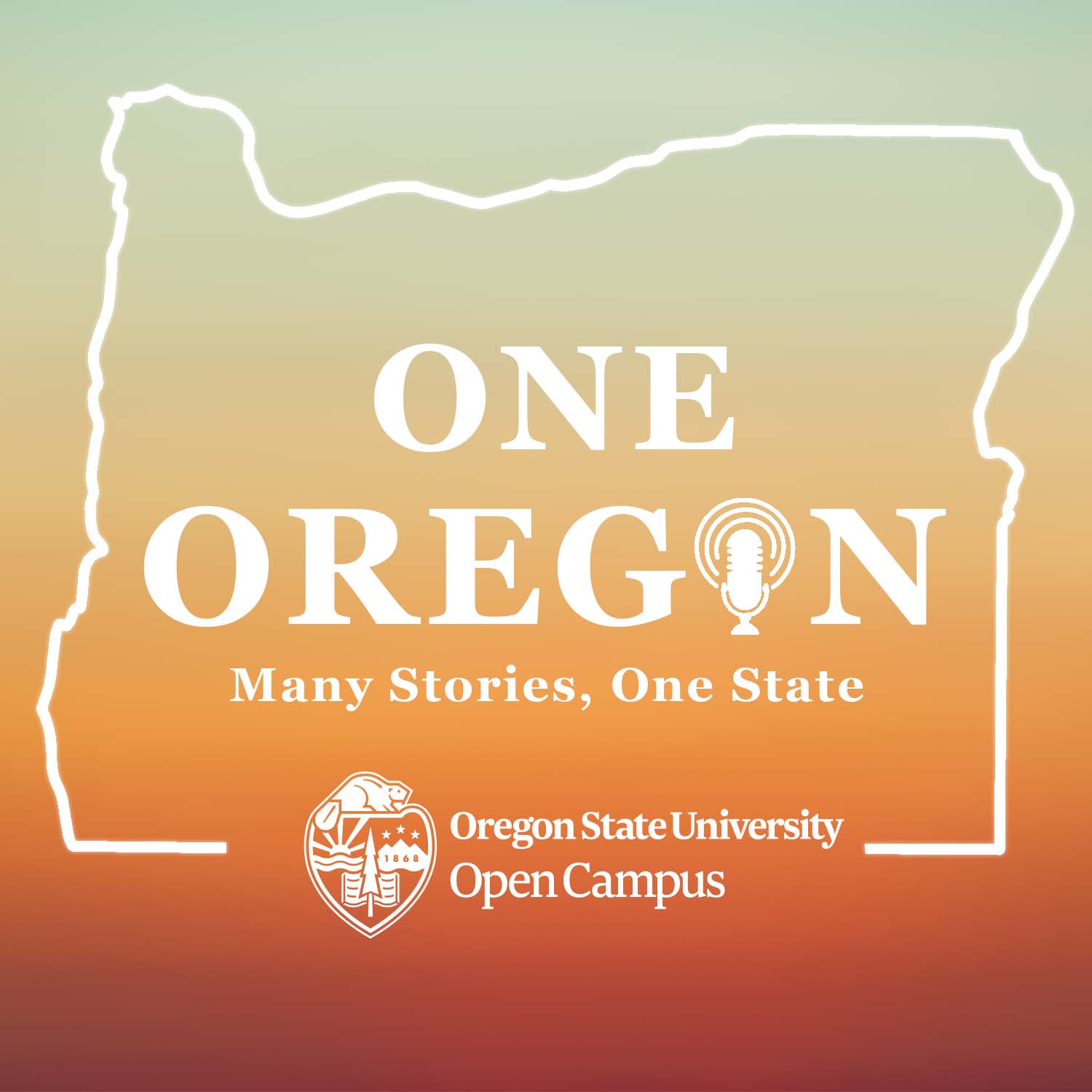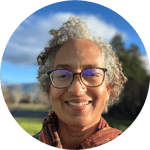Episode 02 Transcript:
Hi Everyone, I’m Emily Henry and I’m Ann Harris welcome to One Oregon… a podcast featuring stories from real people from across our state sharing about their experiences and lives.
We hope that hearing their stories will help to break down barriers and smash pre-conceptions that we may have in our minds about what it means to be an Oregonian (and that you will hear something you can relate to or appreciate in each of them). It is our intention this podcast will have a positive ripple effect that will help to bring us all together as One Oregon.
Today we are joined by Zachary Stocks, Executive Director of Oregon Black Pioneers, Oregon’s only historical society dedicated to preserving and presenting the experiences of African Americans statewide. Zachary started as Executive Director in 2020 and is the first Executive Director in the history of the organization. Zachary joined us for this interview from his home in Astoria, Oregon.
And we’ll start where we always do – by hearing how Zachary’s Oregon story began...
Zachary: I'm from Virginia originally and the first time i ever visited Oregon was in 2012 when i was moving from Virginia to Seattle to go to grad school and my partner and i drove across the country so we reached Oregon from Idaho along i-84 and i remember how surprised i was to see all the desert landscape because the only image in my mind i had of Oregon was of evergreen trees and thick forests so that was pretty different and i remember distinctly during the drive that we were low on gas at one point and i saw this big lake appear on my right and i told my partner i said hey you know we better get some gas pretty soon I'm going to stop at the next exit that we see once we pass this lake so we're driving and then we're driving and we're driving and we're driving I'm like wow this lake is still going this is huge I've been driving for like eight minutes and there still haven't been any exits and I'm starting to think we're gonna run out of gas um and then after like 15 minutes I'm looking around and thinking this is the biggest lake I've ever seen this must be a historic lake it's probably the biggest lake in the northwest what is it called and so we look at the map and i realized it was the Columbia River so that just goes to show you my knowledge of Oregon.
We asked Zachary to share some of the stories of the Black Oregonians who have called Oregon home over the past 400 years. And we begin? We start with the story of black migration to the area through the Oregon Trail.
Zachary: so Oregon's Black history actually begins in rural communities not in our cities Portland didn't really have an African American community so to speak of until after the arrival of the first transcontinental railroad in 1884 but people of African descent were arriving pretty steadily in Oregon since even before its territorial days so black migration to Oregon in the 19th century really begins with the Oregon trail and overwhelmingly the black pioneers who cross the continent were doing so in the service of white families free and enslaved blacks were traveling alongside white immigrants and the wagon trains from Missouri heading toward Oregon City in the Willamette Valley on the trail black women typically acted as cooks and as midwives nurses they took care of the children and the elderly while black men usually drove the wagons or attendance of the livestock there were very few black individuals or families who came to Oregon on their own free will because the cost of the trip were really high and Oregon's changing racial exclusion laws made it pretty unclear if blacks would be able to permanently settle in Oregon. So you can imagine coming here and then realizing that you can't stay so the blacks who did make the trip ended up scattered around the Willamette Valley. There was really no singular black community to speak of but that said the black tribes travelers remained in touch with other black migrants on their wagon trains. Other forces which brought blacks to rural parts of Oregon were related to labor Oregon had a gold rush in the 1860s and in Jackson county places like Jacksonville emerged as a boom town there were a lot of black residents of Jacksonville along with Hawaiian and Chinese laborers too. In the 1890s black coal miners started working in coos county um they were many of them came from Virginia or West Virginia and in the 1910s we see places like Maxville and Wallowa county where black loggers were brought in from the south to work in the timber industry in pretty much all of these cases those residents didn't remain in Oregon when those industries declined and very often the black laborers were the first ones to be fired
I really hadn't thought about the fact that there blacks folks on the Oregon trail, on those wagon trains and serving in those capacities it's never been in the pictures or textbooks that I recall seeing.
just three percent of the overlanders who crossed the continent were black so it's already an extreme minority and not all of those individuals went to Oregon most went to California and so it was really a tiny number comparatively speaking of black individuals who crossed on the Oregon trail and ended up in the Willamette valley but nonetheless we never hear about them even though they ended up in all the same places that became the first permanent settlements of the future state of Oregon
Despite their small numbers, there are still stories coming out about Black Oregonians throughout Oregon’s history. Oregon Black Pioneers regularly receives new information that help us understand more about the experiences of black individuals who’ve lived all over the state.
Zachary: one example that comes to mind a couple weeks ago i came across a week-long series of stories from 1903 about a black farmhand named Tom Johnson who ran off from the La Grande area with a married white woman the wife of j.j Murchison uh Johnson was working for him and Johnson and Murchison's wife developed feelings for one another and one day she came up with an alibi and met Johnson at the train station with her bags and her baby girl and the three of them uh took the train to Portland and when j.j Murchison found out what happened he and the union county sheriff demanded Johnson's arrest and extradition and there was uh discussions in the paper that suggested that he would be lynched if Johnson were brought back to union county and so he was arrested in Portland but he hadn't committed any crimes so Portland police let him go and j.j Murchison ended up in Portland himself trying to find his wife and daughter and potentially to find Johnson and bring him back to union county but he never found any of them and his wife left a letter saying that he that she would never come back and after that it's reported that he gave up the search but this is one story that played out in as headline news for over a week in both the Oregon Daily Journal and the La Grande observer um and he was Tom Johnson was referred to by the n-word and all sorts of awful language so this really demonstrates how the white press considered Johnson the guilty person in this whole affair and how a tryst between you know an interracial couple would be the top news in the state for a while so these are the kinds of stories that we try to dig up whenever we get a chance
Emily: so interesting do you know where they ended up or did they kind of disappear after all of the hubbub of the day
Zachary: the trail runs cold yeah
I have been learning that Black women played a pivotal role in Oregon history. In particular, I’ve been learning a bit about Hattie Redmond. I know she was a suffragist who spent much of her life in Oregon. Oregon State University recognized Hattie’s impact on the state with the recently named Hattie Redmond Women and Gender Center on campus. We asked Zachary to tell more about her.
Zachary: Hattie Redman was born in 1862 in St Louis and she came to Oregon as a child when her family took a job as the caretakers of a homestead in hood river but they moved to Portland just i think just about a year later when the land was sold. So Hattie's life is not well documented before the 1910s but we do know that in 1893 she was married and in 1910 she got a job as a janitor at the Oregon U.S. district court building. but all the while while Hattie was working as a janitor she was also working hard outside of work to organize for women's suffrage. She had a leadership role in the colored YWCA and other activist organizations we believe that maybe that was inspired by work her father did who also was quite involved in social activism. Hattie was the first officer of the Oregon colored women's council and in 1912 she formed a new organization the Oregon colored women's equal suffrage association and she became its first president and in that role she toured Portland giving lectures on women’s suffrage and urging black men to vote in support of the passage of an equal suffrage amendment proclamation uh for the state of Oregon and so that measure was put on the ballot that same year and it passed and in 1913 Hattie was able to cast a vote for the first time so after that she continued working as a janitor for many more years till 1939 and she died in 1952 and her story was pretty obscure until recently but now she's finally getting the recognition she deserves as one of Oregon's woman suffrage champions on the same level as Eva Emery Dye or Abigail Scott Dunaway
Zachary: my favorite story from Oregon's Black history is the story of Letitia Carson who was one of the first black women in Oregon to own her own land and Letitia was born into slavery in Kentucky around 1815 and in 1844 she came to Oregon with Irish immigrant David Carson their relationship is not entirely clear because members of David's family were slave owners but the two of them appear to be living as a couple when they get to Oregon their daughter Martha Jane was born on the Oregon trail and they had a son together in Oregon in 1849. and when David filed his original 1845 land claim in Benton County it was for 640 acres which is the amount permitted for married couples but since Oregon didn't recognize a marriage between Letitia and David, he was only able to claim up to 320 acres as a single white man. So David died without a will in 1852 and a neighbor named Greenberry Smith was declared the executor of the Carson estate and smith sold Carson's land and livestock and when he did Letitia believed that she and her children were entitled to the property as David's survivors but the executor disputed her claim by emphasizing that she could not be legally married to David and thus she was not entitled to act as beneficiary and she ended up even having to pay him to retrieve some of her furniture, cookware, things like that um but then Letitia Carson did something really extraordinary she sued Smith for damages by claiming that if she were not his wife then she must have been David Carson's employee and that she was therefore due back payment for her seven years of hard work uh in in his home uh in Oregon and so the court actually agreed and in two separate legal suits in 1855 uh Letitia won over two thousand dollars in compensation and she moved to Douglas County after that and in 1869 she successfully filed a 160 acre land claim of her own under the homestead act
And now we move into more recent Oregon history. The Pacific Northwest may not be the first thing that comes to mind when you think about the Civil Rights Movement in this country. But Oregon has long been a home of the fight for equal rights, including here at Oregon State University.
Zachary: so Oregon's participation in the African American civil rights movement wasn't as high profile as actions in other states but you could argue that it actually has lasted longer. First i want to clarify that black Oregonians have been fighting for justice and equal rights as long as we've lived here but in the 1960s we start to see Oregon's black residents joining in on national actions to protest discrimination and violence. Student activism has been very big here there were protests by students at University of Oregon, Oregon State University other schools even Southern Oregon University had movements where students got together to talk about civil rights and so throughout the 60s and 70s we see university students joining in national black student organizing efforts with walkouts to demand change pushing for new hiring, greater admission of black students, courses which discuss African and African American history, and the creation of black student unions. In 1969 Oregon State University the black student union famously interrupted a lecture by Linus Pauling to state their grievances and demands that same year 69 there were angry protests by a group of Portland teenagers in a city park which led to a police crackdown that closed all of Albina for three days. The incident has since become known as bleeding Albina uh residents they were beaten and they began starting fires in response and governor Tom McCall uh even mobilized the national guard but thankfully there were no serious injuries no lasting injuries
let me say that police violence has been a constant theme for protests in Oregon since the 1960s though especially in the wake of the police killing of Lloyd Stevenson in 1985 which has a lot of parallels to the local response to the murders of George Floyd and Breonna Taylor in 2020. another major theme in Oregon's black civil rights history has been housing generations of redlining and racially restrictive housing covenants led to nearly all of black Portlanders being forced to live only in north and northeast Portland from the 1940s onward and as white residents left for the suburbs these areas saw a decline in investment and infrastructure which made them pretty easy targets for urban renewal programs of the 1960s and 1970s and so projects like the expansion of interstate 5 or the creation of the memorial coliseum, the expansion of Emmanual hospital that never happened, those led to the demolition of hundreds of black residences which displaced thousands of members of Portland's historically black community and when these homes were replaced they were replaced by unaffordable housing and retail which catalyzed gentrification and further pressured the few low-income black residents still remaining there and all of this is still happening it's all still going on so i would argue that we're still in a period of civil rights movement for Oregon's African American community
This may be the first time you are hearing some, or all, of these stories. And the state of Oregon has recognized the critical need for a more inclusive telling of Oregon’s history. In 2013, a senate bill was passed to transform Oregon Studies in schools. Part of this bill requires the Oregon Department of Education will create materials and trainings that present a more balanced representation of the contributions of African American and Black Oregonians to the state’s history. And what are the consequences when we leave out the history of a whole group of Oregonians?
Zachary: i think we lose the opportunity to fully understand our state's heritage the fact that black people have been witness to every important moment in state history that really matters uh it says that this is a place that we have helped to create and that any remembrances or portrayals of Oregon's history without us are incomplete. You haven't learned Oregon's history if you haven't learned about Oregon's Black history. You don't know about Oregon if you don't know about Oregon's legacy of white supremacy and anti-black racism black people have walked on Oregon's shores since literally the first day of non-native habitation here there's no point in time when there have been white people in Oregon but not black people not a single day but yet so few people know this and that's because it was designed that way our stories were never supposed to be preserved because Oregon was never supposed to be a place for us to exist in. and when our presence in Oregon isn't acknowledged it perpetuates the stereotype that Oregon is a place that's only for white people and that in turn makes it easy to ignore our contemporary needs and the things that disenfranchise us, it makes it less hospitable for new arrivals of black people or for Oregon's existing Black residents to stay here and raise their families here and the only way to break this feedback loop is to tell our stories loudly and often and that's what Oregon Black Pioneers tries to do
my hope is that by illuminating some of the stories of people who've made important contributions to our state history who maybe you've never heard of before because of systemic racism that will help to actually break down some of the ways that that racism continues and give us a better picture a more accurate picture of what our state heritage really is and hopefully we can use that as an opportunity to build new understanding and hopefully justice will come from that as well
And we end today with Zachary the same way we always do…by asking, what is something you love about your community?
Zachary: i love that Oregon's Black community itself is so diverse we have professionals we have people with university educations we have people that don't we have blue collar workers we have people who've lived in Portland for generations or recent arrivals from east Africa uh living throughout the valley um people from the Caribbean moving here we've got weirdos and artists and students and elders and young folks, every gender, every religion. We on our own are already a mosaic of the whole world and in that 2.2 percent of Oregon that is black you can find everything that's good and beautiful about the African diaspora and i love that
Zachary: if anyone really likes the things they've heard today and they want to support us and help us be able to continue to learn and share these stories i hope that they will visit us at Oregonblackpioneers.org or on Facebook at Oregon Black Pioneers and consider making a gift everything that we do is dependent on donations so your support really does matter
Thank you to Zachary Stocks for taking the time to chat with us and share more about Oregon’s history.
You’ve been listening to One Oregon: Many Stories, One State. I’m Ann Harris and I’m Emily Henry.
We want to thank Tim Mayer, jazz piano player and jazz activist, for offering his time and talent to creating a uniquely Oregon musical environment for our podcast
Also, a huge thank you to Rick Henry, editor extraordinaire, for his patience and persistence in guiding us through this first season - we could not have done it without you.
Thanks to you for listening! Please tell your friends about us. We hope you’ll join us again for another episode of One Oregon







